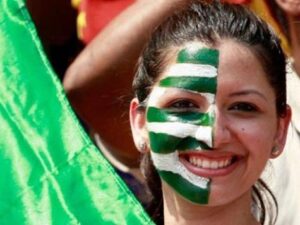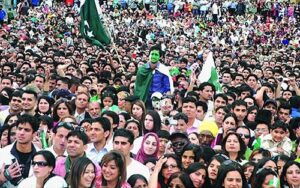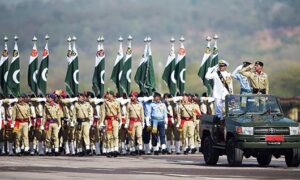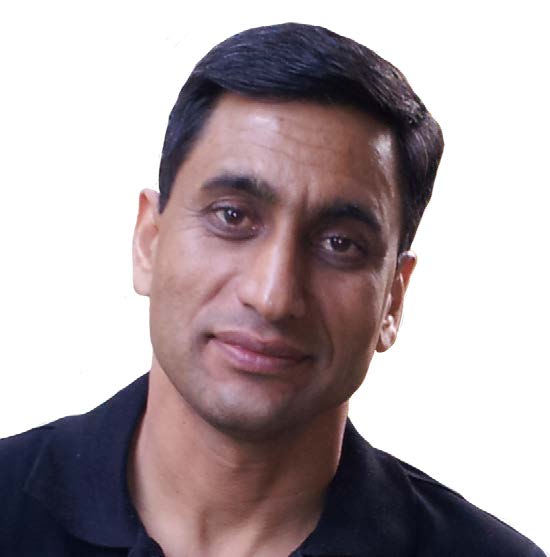Humanity’s quest for identity is as perennial as human origin itself, but particularly in the aftermath of the French Revolution in 1789, modern Europe witnessed the huge power of rising nationalism that brought along both development as well as destruction. Nations took pride in theories of racial and ethnic superiority. However, after suffering the misfortunes of the two Great Wars, the term ‘nationalism’ is somewhat now perceived in a negative sense. Despite this, nationalism remains the founding stone and source of strength for all modern nation-states.
Pakistan endured many challenges to its survival, peace and prosperity since its birth on Aug. 14, 1947. Having been created on the power of an ideology that drew strength from a separate religious identity, Pakistan even today finds challenges defining its nationalism, and instead of moving on the path of economic and social prosperity, the nation is often dragged into ceaseless debates about strategic orientation of the state and society and their relations with the individual.
The ultra-conservative and ultra-liberal small minorities cloud the real issues of the common man.
Of man’s many shortcomings, one is that his powers vis-à-vis the grand scale of time and space stand limited. In most cases, man tries to present the universalistic solutions for all times, but every time it is found responding to challenges of his own times, and limited bounds of space. Thus, we Pakistanis are also obliged to follow this and stay focused on our times, geography, people, and their well-being despite the limitless stretch of ideology and imagination.
Two Defining Limitations
A revisionist India with its huge size, population, and clout has never accepted the reality of independent Pakistan, and has never failed to mention the creation of Pakistan as a vivisection of their sacred Bharat Mata. As we Muslims draw strength from our holy book — which is universal and for all times — for many Indian Hindus, the idea of Bharat Mata or Akhand Bharat remains sacred. It haunts them when they look at the map of South Asia. In their ‘cherished goal’ of seeing a united India, there is no distinction, whether it is achieved through an all-embracing apparent love-fold of Gandhi and Nehru, or the deathly gripping Hindutva under the Bharatiya Janata Party (BJP). In their moments of both love and hate, when many Indians claim that ‘there is no difference between Pakistan and India, and their people share the same culture and cuisine etc.,’ they forget that this oneness mantra raises alarm bells for Pakistanis.
Since Indian Hindus cannot scrap the grand Bharat Mata notion from their religious scriptures, their desire for oneness will keep posing a permanent threat to the separate Pakistani nationalism. Indians have failed to accept the 1947 Partition. They would continue trying to dominate and subjugate our nation, and no Indian friendship-cloak could ever hide it.
Pakistan as a geographic entity, safeguarding the interests of Muslims living in the north western part of British India appeared as an idea in 1930, but the regions and ethnicities that it comprises today are centuries old with distinct and proud history and culture. Despite the enormous unity that the Pakistani nation draws from religion, these powerful ethnic expressions can be exploited by any foreign power that aims to weaken our nation. This also remains a historical dilemma that when it comes to the issue of settling internal power crises, religion alone cannot do so. Islam’s history is full of such examples where the most practicing Muslim fought and bitterly destroyed each other during internal power struggle. This limitation necessitates that along with keeping the religious identity as a unifying symbol, the Pakistani nation also needs those common rallying points and methods, which can ensure the settlement of internal distribution of power and resources.

Pakistan is lucky in a sense that despite the presence of strong ethnic identities, the state bequeathed from the British Raj had powerful institutions of military and civilian bureaucracy, as well as political parties/personalities that could transcend many parochial prejudices. In the absence of a strong centralized state, it would have been difficult to keep the country united and move it on the road to peace and progress. This centralised state is in no way, and should never be, giving semblance of a superimposed body, but as a guarantor of an all-inclusive diverse society functioning on merit and the rule of law.
Challenge of Internal Discord, Institutional Rifts & System Resetting Demands
Our comparatively short history as a nation has seen many attempts of political resetting and consequent dissatisfaction after every such effort. However, this has not stopped our segment of activists, dreamers or political opportunists to attempt this one more time. In the first decade of Pakistan, there was a cry to replace the old breed of corrupt politicians, and there came a new lot of politicians in the 1960s and 70s. Then came a wave to replace the ‘feudal politicians’ with a new brand of industrialists and business class politicians. This change brought along its own ills and the society witnessed the growing role of money in Pakistani politics. Yet again, to achieve the dreams of a better Pakistan, a new breed of presumably austere leadership — with no economic stakes to take advantage while being in the government — has been set in motion after the 2018 elections.
But now as a consequence of economic challenges and administrative failures on various fronts, there is yet again a speculative debate going on to replace the parliamentary system with the presidential system to ensure merit and authority.
Frantic cries also emerge occasionally to totally discard the western democratic system and replace it with some kind of authoritarian system of government for rapid economic growth and social order.

Our ‘revolutionaries’ in fulfilling their dreams — and history is a witness to the fact and no political party is cleared of such charges — intently or inadvertently drag other institutions, including the military and the judiciary into politics.
No one can deny the institutional overstepping too, but it is more on the politics to show character and not get enticed by the lure of power. This should end now as if the state institutions get maligned on a daily basis, nothing will be left with the state to protect the society. This should be understood by all.
While making system resetting arguments, usually our zealot visionaries and political opportunists ignore to answer the questions related to the peaceful transfer of power. It would be prudent to remember that democracy is not the result of any conspiracy, but an outcome of human struggle spanning over centuries to put a check on the ills of absolute power and prevent the use of violence in the transfer of power. It is a fact that democracy is not the most efficient system for rapid development, but it has an inherent power of inclusivity and integration. A nation like Pakistan which has yet to fully integrate the powerful ethnic entities into a cohesive society, democracy provides a mechanism to settle issues through the power of ballot and debate. As far as the argument of the failure of democracy is concerned, a belief in the system and consistency would allow it to deliver at least the minimum expected out of a people’s representative system. Those who wish to see a revolutionary change forget to see that keeping in view challenges to Pakistan’s security, particularly from India, we cannot afford a prolonged internal strife or bloody revolution in the country. Any violent actor operating on this land will be directly or indirectly used by the enemies of Pakistan. That is the reason previous coups etc. were mostly soft. Any such attempt will put our survival in jeopardy and should be avoided. Here, the example of China is often cited by the change seekers, but they again forget that millions of Chinese lives were lost to put in place this one party communist system. Nothing comes without a price, but every price is not to be paid as it could cause total bankruptcy and collapse.
Alongside political acrimony, goes the unabated ideological schism in the country. In these times of economic decline, and political and social unrest, two segments — the far-right and ultra-liberals — seem quite proactive to shape the Pakistani state and society in their image. Extreme religious expressions have more acceptability and space in a society which is suffering from poverty and injustice. However, we should never forget that if growing religious extremism is bad for India in the long run, it is also not profitable for Pakistan.
It would also be important to keep Afghanistan’s political landscape in our minds due to our inseparable geographical, religious, and historic linkages. A politically and socially vibrant Afghanistan is more in the interest of Pakistan in the long term than a momentary geopolitical triumph.
As far as the politics and activism of ultra-liberals are concerned, it is ironic that most of their clichés are west-pleasing endeavours rather than an outcome of a deep philosophical thought. These elements fail to take into account Pakistan’s ground realities and often create storms in a cup of tea using the traditional and social media in the name of freedom, human rights, and social equality. They repeatedly condemn our military expenditures and nuclear capability as a barrier to our development, but forget to condemn the west which produces and exports the most sophisticated weapons. Similarly, they forget to notice that many poor countries neither have large forces or nuclear arsenals, yet they remain poor.
The propaganda by the ultra-liberal element has the potential to bring more ruin and anarchy than prosperity. We need to remain vigilant. Let’s wait for an ideal world to have an ideal Pakistan.
If the past is of any use then it should expose our shortcomings and follies committed to ‘purify and cleanse’ the system. This drive started in the first decade after the creation of Pakistan and since then, both hard and soft versions of authoritarian approaches were tried but results are in front of us. Of the last drive which started after the 1999 coup, the end point was return of the same leadership, which was pushed out of the country.
It would be prudent to notice that by pushing out the national leadership to other countries, leaves them at the mercy of foreign powers. After all, why should these countries favour them in their difficult times if some policy concession or softness is not expected or guaranteed later? By such imprudent acts, we facilitate the jobs of the hostile intelligence agencies. It would be far better to try the culprits here, or leave them if acquitted by the courts to the people’s verdict in elections. Our national honour also demands that we settle our political disputes within the boundaries of our homeland rather than forcing politicians to take refuge and asylum in other countries.
Progressive Nationalism
Amidst these system resetting debates and tension among various institutions of the state and within the society, Pakistan is lucky to have one such document that in some manners accommodates the rational and lawful demands of diverse segments of our nation. The 1973 Constitution of Pakistan evolved after a consensus that not only addresses the ideological questions but also the routine power and governance-related issues between the individual and the state, and the federation and the provinces. The Constitution validates the separate religious identity of Pakistani nationalism, which remains the raison-detre of its freedom struggle. At the same time, the Constitution also ensures various safeguards to the freedom of individual, religious minorities, and women. The Constitution also provides platforms to smoothly settle the power-related issues between provinces and the federation.
Where it yearns for maximum provincial autonomy, the constitution also envisages a strong centre that can effectively address the internal and external issues, faced by the nation. It also clearly enunciates the role, duties, and bounds of various organs of the state. The 1956 and 1962 constitutions could not survive for long and resultantly the country witnessed 1971 debacle due to non-resolution of internal power differences. In the two-year time, the 1973 Constitution will see its golden jubilee, and the nation is lucky that it has survived despite coups and political upheavals. This progressive document is pro-people, pro-state, and pro-federation.

In these challenging times when internal rifts and power struggle can lead to further economic, political, and social decay, we all can make deliberate efforts to cultivate and promote a progressive Pakistani nationalism which neither succumbs to the dictates of religious extremism nor of ultra-liberals. The 1973 Constitution serves as a foundational pillar of our nationalism and defines the limits of our political practices and puts a check on any adventurism. A few points of the progressive Pakistani nationalism should include:
- Pride in the continuity of democratic institutions under all circumstances. The evolution and refinement should come through the established mechanism rather than machinations. A national truth and reconciliation commission, comprising members from all segments of the society, should help address the unsettled issues.
- Where the Constitution guarantees supremacy of the political institution, other institutions must be allowed to maintain internal autonomy and meritocracy.
- A fully autonomous judiciary and free media should serve as watchdogs to any abuse of power or overstepping.
- Whereas religious identity remains central to our nationalism, no one should be allowed to coerce an individual and take away liberties as guaranteed by the Constitution. Religious freedom to minorities should be a hallmark of our society.
- Pakistani women are a pillar to our national strength and nothing should be permitted to hamper opportunity, life, or career for them.
- Wherein we remain committed to regional and world peace, Pakistani nationalism should be confident and proud enough to maintain necessary military power potential. ‘From geopolitics to geo-economics must not be taken as a moral goal but as another facet of power politics in the international arena. Peace should remain a condition mutually desired rather than a dictated one by any regional or foreign power.
There can be a desire to change overnight, but Pakistani society and state is not ready to undergo the rigours of such a cataclysmic change. The enemy remains at the door, waiting for the opportunity, and only internal discord or façade unleashed under any pretext, will allow him to exploit and further weaken us.

The writer is a student of human history. He has authored two books: A Lone Long Walk and Where Clouds Meet.



